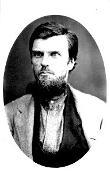Australian bushranger.
The son of an Anglican clergyman, Andrew George Scott was born in Ireland: his father's ambition was to see him join the priesthood, but instead trained as an engineer in London.
The family moved to New Zealand in 1861, following the gold rush. When the New Zealand Wars (sometimes called the Maori Wars) escalated dramatically in the early 1860s, Scott enlisted as an officer, was wounded, and was subsequently court-martialled and discharged on the grounds of malingering.
He left New Zealand for Australia, where he fell in with Bishop Charles Perry, and was later appointed as lay reader at Bacchus Marsh, Victoria. Intending to enter the priesthood (as his father intended) once he had completed his tenure, he was then sent to Mount Egerton, then a booming gold-mining town, after the discovery of a rich reef of gold in 1856.
In May 1869, not long after his arrival in Mount Egerton, Scott was accused of forcing a bank agent, Ludwig Bruun, to open the bank's safe. The figure who robbed the bank was heavily disguised, and left a note signed 'Captain Moonlite'. Scott counter-accused Bruun, successfully deflecting the police's attention, and left Mount Egerton. For more information on the Mount Egerton robbery, see 'Daring Bank Robbery at Egerton' (Geelong Advertiser, 11 May 1869) and 'The Egerton Bank Robbery' (Ballarat Star, 27 May 1869).
Back in Sydney, Scott resigned his role as lay preacher, and lived a life of leisure. In December 1869, after a purported absence of some months in Fiji, he sold an amount of gold roughly resembling the proceeds of the Egerton robbery. From this point, Scott committed a series of (usually non-violent) crimes in pursuit of money, until he was convicted of obtaining money by false pretences and sentenced to jail. At the conclusion of this sentence, he was arrested in Sydney on suspicion of committing the Egerton robbery. Awaiting trial in Ballarat, he escaped in company with five other prisoners. Re-captured, he was convicted and sentence to ten years' hard labour.
After serving two thirds of his sentence, Scott was released in 1879, and met up with James Nesbitt, whom he had befriended in Pentridge. While also retroactive analyses of Scott and Nesbitt's relationship are, by necessity, speculative, much has been made of the overtly romantic and devoted relationship evident in Scott's letters. See also Jeff Sparrow's 'A Queer Bushranger : The Tale of Captain Moonlite'.
After a brief career as a speaker on prison reform, Scott returned to crime, in company with Nesbitt and a group of young men (in the case of Gus Wreneckie, only fifteen years old).
In November 1879, Scott and his gang bailed up Wantabadgery Station, in New South Wales. They terrorised an increasing number of hostages until a reinforcement of troopers arrived. In the ensuing gunfight, both Gus Wreneckie and James Nesbitt were shot dead, and the others captured. Scott and his companion Thomas Rogan were hanged in Darlinghurst gaol on 20 January 1880.
In January 1995, Scott's remains were disinterred from his grave at Rookwood Cemetery, and reinterred in Gundagai next to the grave of James Nesbitt, as he had originally wished.
 8451729054037323551.jpg
8451729054037323551.jpg
 8451729054037323551.jpg
8451729054037323551.jpg